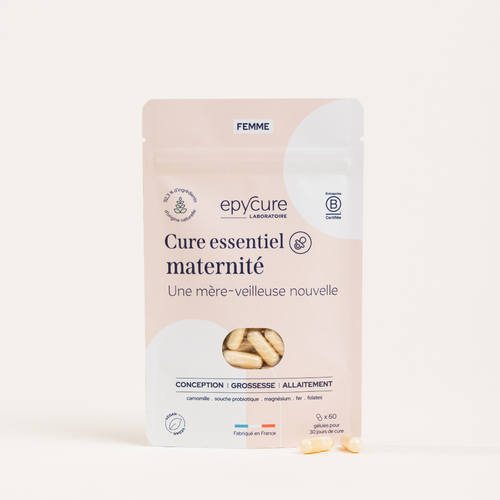If pregnancy is a unique and particularly happy moment, it is still a trying period for the human body which can present some inconveniences (nausea, cramps, fatigue, irritability, etc.). For her health and that of her child, the mother must be able to provide a set of essential nutrients for her pregnancy . During its development, the fetus needs a large quantity of nutrients which it draws from the mineral reserves of its mother. Therefore, an adaptation of nutritional needs must be put in place to provide the necessary vitamins and minerals through a balanced and varied diet or by taking natural food supplements, not only for the development of the fetus but also for the well-being of the mother. These needs will change during pregnancy,
But what are the specific nutrients that help you pamper your body and create an optimal environment for your child ?
Essential nutrients for a peaceful pregnancy
A woman's nutritional needs will evolve during pregnancy to compensate for the needs of the fetus. Many nutrients are then recommended by health professionals; it is essential to avoid vitamin and mineral deficiencies , as well as overdoses. Here is a comprehensive list of these essential vitamins and minerals for a healthy child and mother, which can be provided through both diet and dietary supplements.
Vitamin B9
Vitamin B9, also known as folic acid, is one of the most important vitamins during pregnancy. It proves its importance in the first hours of pregnancy by participating in the synthesis of DNA and the cell division process allowing the development of the brain , the nervous system and the spine of the embryo. It is during the first 8 weeks that the cells of the embryo develop the fastest, a folic acid supplement is therefore essential at the very beginning of gestation , or even several weeks before, in the case of a desire for a child where the mother can begin to store this vitamin.
A folic deficiency can lead to multiple complications such as premature birth, growth retardation , or even malformations such as neural tube defects, leading to spina bifida. This abnormality very often leads to serious after-effects in children, particularly neurological ones.
Vitamin D
Vitamin D optimizes the assimilation of calcium and promotes its fixation on the bones of the fetus, it is therefore essential for the proper development of the child's skeleton . However, caution must be exercised when using these two micronutrients together. Indeed, taking vitamin D can lead to hypercalcemia, which can cause premature birth. Conversely, it is one of the vitamins with the greatest risk of deficiency depending on the season ; this vitamin deficiency is particularly seen in women giving birth between March and June with the absence of exposure to the sun.
Vitamin D plays a major role in fetal bone formation from the 6th month of pregnancy and may help stimulate the immune system to reduce the risk of gestational diabetes and intrauterine growth retardation.
Calcium
Calcium is the most abundant mineral in the body . Its need increases by 30% during pregnancy, based on its importance for bone health. It ensures the mineralization of bones and teeth , as well as muscle contraction, particularly for heart rate. It will be particularly essential for the last 3 months of pregnancy when growth is finalized and reserves are formed so that the child is born and grows in the best possible conditions.
A deficiency would have consequences both for the child - growth retardation, hypocalcemia - and for the mother - insufficient weight gain, osteomalacia, hence the importance of a good intake through food or supplementation.
Magnesium
Magnesium is a mineral salt essential to both the health of the fetus and that of the mother. During pregnancy, magnesium needs increase. It is a major component of bones, muscles and nervous tissue . It is therefore necessary for the neurological, cerebral, bone and muscular development of the fetus. In the same way as vitamin D, magnesium helps to fix calcium . It also intervenes in the immune system and thus allows the pregnant woman to be better protected against external aggressions. It participates in the regulation of transit and muscle contraction and thus considerably reduces the frequency and intensity of cramps during pregnancy. Adequate intake helps to combat fatigue and nervousness, which are common during this period. Finally, magnesium helps to reduce the risks of prematurity ; a deficiency in pregnant women could result in sleep disorders, severe fatigue, anxiety or even muscle pain .
Iron
Iron is also an essential mineral for the body during pregnancy. However, it is very common for women to have insufficient iron intake even before pregnancy. This is why doctors systematically perform a blood iron test during the first weeks of pregnancy . This mineral is found in red blood cells. Thus, a sufficient iron intake helps ensure fetal growth and placental development .
Iron deficiency increases the risk of prematurity and perinatal mortality . It can also cause anemia in the mother during and after delivery. Note that iron supplementation can be harmful for women at risk of gestational diabetes and preeclampsia.
Iodine
Iodine is an essential nutrient for the production of thyroid hormones , which are essential for heartbeat, brain development, intestinal transit and skin hydration. However, a large part of the world's population is deficient in it. These deficiencies are even more serious in pregnant and breastfeeding women whose iodine needs increase considerably. Indeed, the thyroid hormones produced by the mother are essential for the growth of the baby and for regulating the development of its brain and its immune system by improving fetal-maternal transfer . An iodine deficiency can, on the one hand, slow the growth of the child and have negative effects on its mental development and, on the other hand, increase the risk of spontaneous abortions in the mother.
In this context of big changes but also of questions, it is crucial to take care of your body by providing it with all the nutrients it needs . For this, the Essential Maternity Cure has been specially developed to adapt to the specific needs of pregnant women, breastfeeding women or those wishing to have a child. It acts as much on the proper development of the fetus as on the physical and mental well-being of the mother thanks to the synergy of carefully selected nutrients: vitamin B9 , magnesium, iodine, iron, matricaria chamomile and probiotics, to name but a few, all in a gastro-resistant capsule. In addition, the formula is composed of 92.3% ingredients of natural origin and validated by an expert toxicologist to guarantee your safety and that of the baby while pampering your body.
It is important to know that certain dietary supplements should be avoided at all costs during pregnancy . Indeed, certain active ingredients can cause problems, particularly algae, which are often rich in heavy metals , caffeine, phytoestrogens and phytosterols.
Before resorting to self-medication, be cautious and consider consulting a healthcare professional for advice. Do not consume a food or dietary supplement unless you are certain it is safe for you and your child.



